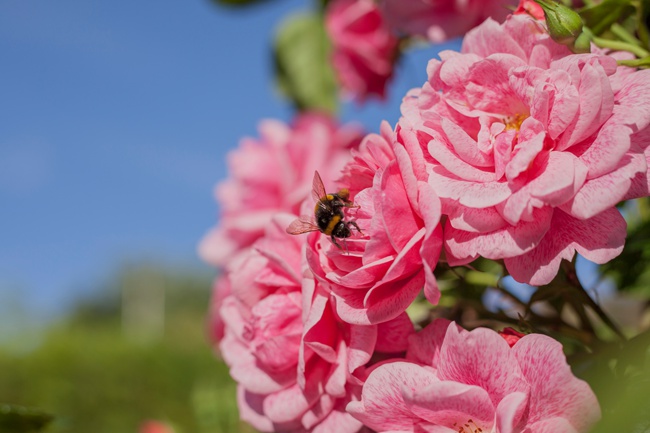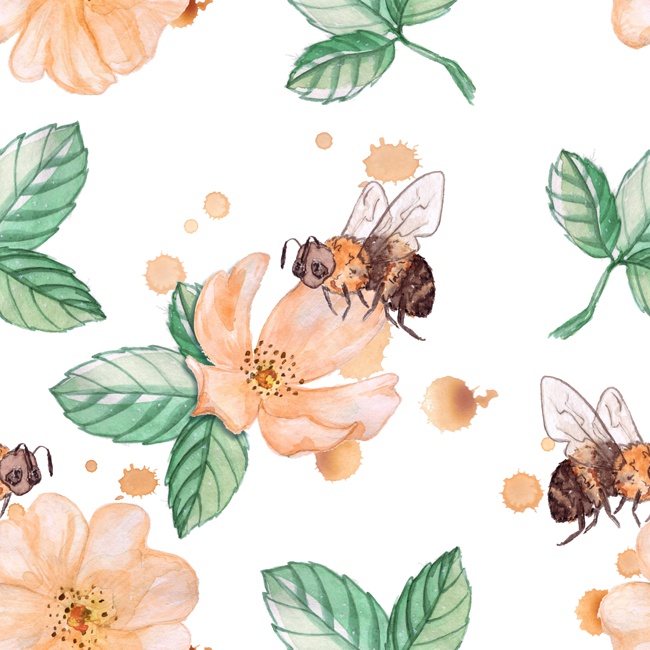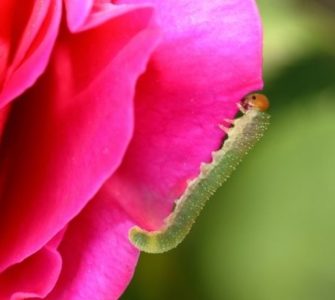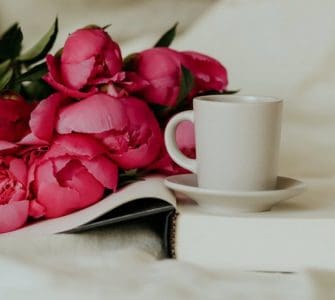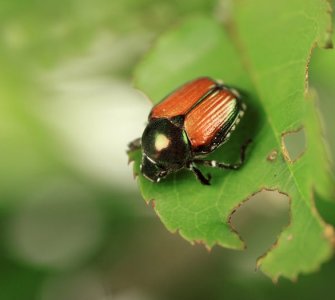I had this weird desire during lockdown to start bee-keeping! We all love honey in this house. So of course, being the owner of this blog, I got to wondering- are roses bee-friendly?

Are roses bee-friendly? a look at how roses can attract bees to your garden, and what to do if you want to keep bees away from your roses!
Roses are bee-friendly and bees are great for roses! Roses attract bees, which prefer brightly-coloured roses. In particular, bees are attracted to roses which emanate an intense scent. A rose will attract all sorts of pollinators due to the juicy, quality nectar it creates.
Bee-friendly rose varieties include Harlow Carr, The Generous Gardener, The Lark Ascending, Scepter’D Isle, Lady of Shalott, Golden Celebration and Iceberg. All of these varieties are tried and tested and loved by bees. Generally, bees are great fans of small-blooming roses which flower abundantly. Climbers like Kiftsgate are a perfect pick for an un-bee-lieveable garden!
If you’re trying to keep bees out of your garden, plant red roses and avoid yellow ones – bees don’t see red and will fly right past, but yellow roses remind them of sunflowers which they love! Cucumber, garlic cloves and peppermint are great repellents which you can just throw around your roses to keep them away without harm!
When looking to attract bees to your garden, prune, deadhead and water your roses as you usually would. However, take more care feeding your roses, as only organic fertiliser will yield organic nectar and avoid poisoning the bees. Rice water, tomato feed and coffee grounds are great picks for organic fertilisers. I
f you have pests, use a neem oil solution with water, and steer clear from RoseClear which is most likely dangerous for bees.
Table of Contents
Do roses attract bees?
Roses attract bees and all other sorts of pollinators, namely birds and butterflies! However, bees are the most common and most efficient rose pollinators.
Bees are incredibly attracted to most kinds of roses. Flying from rose flower to rose flower, bees drink the flower nectar, and in turn get covered in rose pollen. As bees are extremely invested in drinking nectar and need to visit many flowers to get the amount they need, they will transfer all sorts of pollen around. This will ensure the pollination of all of your outdoors rose plants, both balcony and the ones planted in the garden.
If you’re wondering if pollination is good for roses, I’m happy to tell you that it definitely is! Roses have to be naturally pollinated in order to produce fruits and seeds, which in turn enable to rose to live on and prepare the material for the next generation.
What attracts bees to flowers?
Bees, just like other pollinators, love the juicy nectar of your rose plant! Bees drink nectar for sustenance, providing the side-effect of pollination. If you’re seeing bees around your roses in droves and are not sure why, you probably have strongly scented roses, which are very bee-friendly roses! If your rose plant is very musky or very fruity in scent and emanates over long distances, this will be especially attractive of bees as it indicates better quality nectar.
Are bees good for roses?
Bees are incredibly beneficial for roses, and gardeners often plant special varieties which roses like in order to attract as many critters possible! Bees like richly fragrant roses, as they provide the best possible nectar.
However one type of bee can really damage your rose – a leafcutter bee. This bee eats away at your rose leaves, and your rose bush can end up looking dead and damaged. While you can take measures to keep leafcutter bees away, I prefer to let them stay! They hardly ever damage the rose, they don’t totally decimate the leaves, just take a few holes here and there. And the parts of the leaves they create they are actually taking to make a nest with, which makes me happy!
Which roses should I plant to attract bees?
If you want bees in your garden, the best choice is to plant the varieties which have single or semi-double blooms. The reason behind this is that this type of a flower allows the easiest access to the stamen of a rose, which bears all the pollen.
Aim for roses with 5 to 15 petals, as these tend to produce most pollen. These blooms tend to have more stamens as well. Generally, bees quite like roses which have abundant small flowers on the bush, as their quest for nectar is that much easier when the blooms are bundled together. Avoid really big, overcomplicated roses which yield blooms with 30+ petals, as these are not a bee’s favourite! Additionally, the roses you choose should be brightly-coloured and very fragrant. Your favourite climber roses like Kiftsgate rose will also be beloved by the bees in your garden.
If you’re unsure of which rose to pick, here are some of my favourite bee-friendly roses:
- Harlow Carr (bright pink and fragrant, a bee favourite)
- The Generous Gardener (softer colour, but emanates the scent further which bees love)
- The Lark Ascending (bright orange, a very healthy variety)
- Scepter’D Isle (another pastel variety with very intense tea scent)
- Lady of Shalott (very intensely orange, a prolific bloomer which makes the pollination an easier job for the bees!)
- Golden Celebration (a classic rose to attract bees with, intensely yellow and very scented)
- Iceberg (pastel variety, but can grow quite large and emanates the scent far and wide)
Are roses good for honey bees?
Roses are not only great, but almost essential for honey bees. Honey bees love lilac, sunflowers and lavender – but they like fragrant, simple climber roses the most.
The reason behind this is that roses are simply incredibly prolific at producing pollen! On tall roses with clustered smaller blooms, the pollen production is much higher than that of sunflowers, for example. Additionally, small clustered blooms ensure that a honey bee gets all the necessary nutrients on the roses in your garden alone! While being great for the little critters, this means a very quality and faster pollination of your flowers.
Finally, honey bees are not only attracted by roses, but by gardens and fields that offer a variety of flowering vegetation. To increase your chances of bees visiting, consider planting companion plants which produce large amounts of pollen. For smaller gardens and borders, plant honeysuckle, dandelions, snapdragons, poppies, or even mint! If you have a larger garden, consider planting a fruit tree or two – a small cherry tree is a great pick.
How do I keep bees away from my roses?
Some people just don’t like bees – if you have a bee allergy, you’re going to be wanting to keep bees well away from your roses!
There are a few natural tricks you can utilise to keep bees away from roses, but perhaps the best one is to plant roses that aren’t very scented. As bees are attracted to that sweet smell, low scented varieties tend to not attract as many bees.
You can also plant rose varieties which have complicated blooms with an abundance of petals, over 30, but the more the merrier. Lots of petals which intricately cover the stamen are a challenge for bees to get through. They will opt out of pollinating your garden and look elsewhere.
While bees are good for the environment, you might have legitimate reasons to keep them out. Whether you’re scared, throw parties in your garden or simply have inquisitive pets trying to eat them, you can still plant roses and minimise the amount of bees they attract.
Plant red roses, avoid yellow roses
If you’re not ready to give up very fragrant roses, opt to plant intensely red roses. Remember when I told you colour is an important factor in attracting bees? Well, it turns out that bees simply can’t see red. Plant Opium, Freedom or Forever Young to your heart’s content – the bees will buzz away to the next garden!
Conversely, avoid planting yellow roses. Yes, this might be a goodbye to Golden Celebration, Citronella and Kronos. Since yellow roses remind bees so much of honeysuckles and sunflowers, they will flock right to them. While they’re there, they’ll realise that your roses have amazing nectar – soon after, you’ve got a bee invasion on your hands!
Use cucumber and garlic cloves to keep bees away
A simple solution which will keep bees, bumblebees and wasps all away is cucumber. If you don’t want to grow it, simply slice one up and throw it around your roses at the base! The acid in cucumbers is somehow a true repellent for the buzzy creatures. However, it is a godsend for roses, and will serve as a very weak fertiliser as it composts due to the acid content. Win-win in my book.
You can use cloves of garlic for the same cause and it will work just as fine, but I’m personally not a fan of the smell!
Plant peppermint around your roses to keep bees at bay
Finally, you can use peppermint to have bees stay away, as the very strong smell is a natural repellent for most animals. It is not poisonous like most bee-repellent plants, so you can safely either plant it in your rose garden, or pick a fresh batch and place it around the base.
Bee-friendly roses care
Bee-friendly roses care includes all the good things you already do to keep your roses looking healthy and flowering their best. Pruning, watering, sunlight and fertilisation are a must for healthy roses with attractive blooms!
Pruning your roses
Prune all dead, diseased and damaged stems on a rose regularly. Make sure to stop pruning six weeks before the last frosts. Deadhead your roses too, as bees won’t go for the spent, dried and dying rose heads. Snip away, and make some place for new ones which will brim with pollen!
Watering your roses
Water your rose at least once weekly. Don’t let the topsoil go dry, and in summer months up the watering to at least once daily. Underwatered roses will present with droopy blooms, while overwatered roses will have flowers straight-up dying on the stem. Finding the golden balance and providing 3-4 cm of water and keeping the soil moist but not sopping wet will have your blooms prime for bees.
How much sunlight do roses need?
It goes without saying that roses need their sunlight. Bees are the most active in the sun too, so giving your roses more than 7 hours of direct sunlight a day will ensure bee visits!
Fertilise your roses
The most important part of bee-friendly rose care is definitely how you fertilise your rose. You likely already know that the rose should be fed about every 4 weeks, starting from when the last frosts pass, all throughout the season, and discontinuing 4 weeks before first frosts are again expected in the fall. However, as roses directly eat the nectar a rose produces, and the production will depend on the kind of nutrients a rose gets, be sure to ONLY use organic fertilisers! Avoid store-bought and instead go with coffee grounds, tomato feed or rice water. Bees will thank you and the honey they produce will be that much healthier.
How To Get Rid Of Aphids Without Harming Bees
It is quite possible to make a DIY bee-friendly rose spray at home which will be non-toxic to bees! This will help you to get rid of aphids, without harming bees. It’s quite easy to do your part in keeping the environment safe.
This is a recipe for a great pesticide which can help you get rid of aphids, caterpillars, spider mites and rose slugs. At the same time, it will not harm bees! If you have tried hosing your rose off with water, adding spices and herbs around the plant but nothing seems to work – a neem oil solution will work like a charm!
Neem Oil Pesticide
You will need
- garden spray bottle
- 60 ml cold-pressed neem oil (natural cold-pressed oil is best and most potent!)
- 3.5 litres of water
Instructions
- In a big bucket, combine 3.5 litres of warm water with 60 ml cold-pressed neem oil and stir well to combine. Pour over the mixed pesticide into a garden spray bottle of desired size. Seal the spray bottle and give it a good shake before each use.
- Spray your rose completely by misting it with neem oil pesticide. Spray the upper and lower side of every leaf, coat the stems and branches all the way through, and finally give the blooms and roots a spray. While the concoction is not poisonous to bees, it is best to do the spraying at night, while bees are inactive. This way, you will avoid coating them with the neem oil.
- Repeat the process once weekly until the pests you’re having issues with die off. However, keep in mind neem oil pesticide doesn’t store so well. Either keep it in the fridge, or make just enough to use at once.
Is Rose Clear safe for bees?
RoseClear and RoseClear Ultra are insecticides and fungicides which are, in my opinion, not safe for bees.
The instructions officially state that they are safe for bees in your fight against aphids. However, they also implore you to use it in the morning or evening, when bees are not around. Additionally, upon researching further, it would appear that RoseClear got revoked. The formula changed several times due to dangerous ingredients! The active ingredient in both RoseClean and RoseClean Ultra is acetamiprid. This is a neonicotinoid – a dangerous chemical implicated in the decline of the bee population and known to be toxic to birds and butterflies, as well.
No matter what the big companies might be peddling, stick to organic solutions! Neem oil will work as well, if not better, than RoseClear. The added bonus is a clear conscience and knowing you’re keeping bees healthy!
Well, now you know what the buzz is all about when it comes to bee-friendly roses! (Excuse the bad pun…) What are your favourite bee-friendly rose varieties? Let me know – I’m always trying to plant new ones! If you want to know more about good bee-friendly companion plants, check out this Pinterest post!
